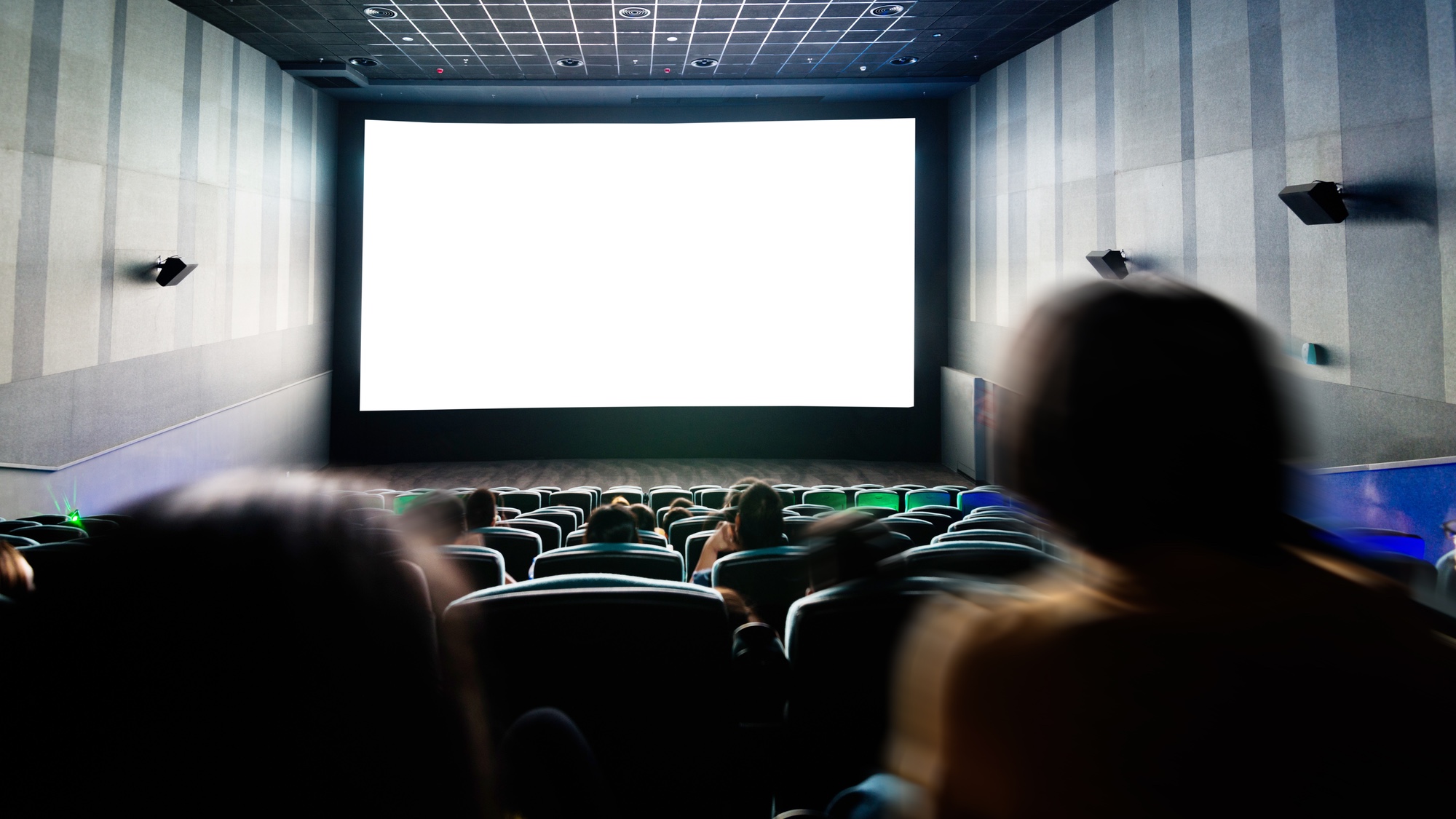Sorry, Christopher Nolan: Movie theaters are the worst way to watch films
These days, there countless better, and more convenient ways to watch movies

Here at Tom’s Guide our expert editors are committed to bringing you the best news, reviews and guides to help you stay informed and ahead of the curve!
You are now subscribed
Your newsletter sign-up was successful
Want to add more newsletters?

Daily (Mon-Sun)
Tom's Guide Daily
Sign up to get the latest updates on all of your favorite content! From cutting-edge tech news and the hottest streaming buzz to unbeatable deals on the best products and in-depth reviews, we’ve got you covered.

Weekly on Thursday
Tom's AI Guide
Be AI savvy with your weekly newsletter summing up all the biggest AI news you need to know. Plus, analysis from our AI editor and tips on how to use the latest AI tools!

Weekly on Friday
Tom's iGuide
Unlock the vast world of Apple news straight to your inbox. With coverage on everything from exciting product launches to essential software updates, this is your go-to source for the latest updates on all the best Apple content.

Weekly on Monday
Tom's Streaming Guide
Our weekly newsletter is expertly crafted to immerse you in the world of streaming. Stay updated on the latest releases and our top recommendations across your favorite streaming platforms.
Join the club
Get full access to premium articles, exclusive features and a growing list of member rewards.
This year has not been great for the movies, or movie theaters. Thanks to the ongoing pandemic, non-essential businesses the world over have been forced to shut in an attempt to curb the spread of COVID19. Theaters were among the businesses to shutter, and movie studios have been forced to either indefinitely delay their releases, or do the unthinkable: make them available to stream.
A few months ago delays were the norm, but as the pandemic continued with no definite end in sight, more and more theatrical releases have become available on demand. Most recently, Warner Bros. announced that its entire 2021 slate would hit theaters, but they would also be heading to HBO Max on the very same day — starting with Wonder Woman 1984.
- These are the best streaming services you can watch right now
- Smarten up your TV with one of the best streaming devices
- Plus: 5 biggest Marvel Disney Plus announcements
This has led to a lot of criticism, most notably from director Christopher Nolan. The Tenet director has long been a proponent of the importance of theaters, even arguing that his latest movie should be seen in a theater. That’s presumably part of the reason why Tenet got a traditional theatrical release back in September, despite the ongoing pandemic. Any talk of going straight to streaming would likely have been shot down, if such discussions happened in the first place.
But the thing is, Christopher Nolan is wrong. Going to the theater is actually one of the worst ways you can see a movie.
It’s not the worst, because there are plenty of terrible options you could pick — like streaming from a Nintendo 3DS, or having to use whatever the hell UMDs were trying to be. Theaters are still pretty bad though.
Lots of arguments can be made in favor of cinemas and movie theaters. Atmosphere, uncompromised audio and display technology, and obviously the ability to see movies as soon as they’re ready — no waiting several months for them to arrive on home video.
But there are plenty of downsides, too: having to stick to a strict schedule; being forced to sit through 30 minutes of ads before each film; lacking the ability to pause when you drank too much soda; and the sharing your space with a bunch of strangers in a room that probably isn’t very clean. Of course, there’s also the cost, in terms of the tickets themselves, the overpriced concessions, as well as the time and fuel needed to actually get to the theater. That’s assuming you don’t also need to pay for parking, which can happen at theaters in large cities.
Get instant access to breaking news, the hottest reviews, great deals and helpful tips.
Do the negatives outweigh the positives? I’d argue that no they do not. My main issue has always been the fact that I have to share the space with a bunch of other people whose actions I can’t control. The fact that theaters still need to remind people to turn off their phones is indicative of that problem. If your friend Alex won’t shut up during your Star Wars marathon, you can at least tell him to shut it or leave. Try that with a random stranger and you’re likely to end up in a fight, and whatever the outcome the rest of the audience won’t like it.
Movies are better in a group, but not that big a group
There’s a case to be made about the atmosphere of a movie theater. Part of that stems from the fact you’re in a darkened room immersing yourself in the movie, and another can come from other people. Being English I’m much more used to less emotive audiences than American readers, but as stone faced as we may seem in comparison, we do still react to what’s on screen.
Amplifying that across hundreds of moviegoers and it does change the way you see things. The fact everyone was laughing actually made my screening of Suicide Squad quite enjoyable, even though the film itself was a steaming pile of manure. Then again it can also have the opposite effect if you’re the only person reacting. Being the only person laughing at a joke is plain awkward.
That’s not to say that the atmosphere can’t be replicated in smaller groups. Adding two of three people to the mix, as opposed to watching alone, completely changes the feel of the room. Emotions are generally quite contagious, and if you ever went to a bar during a sporting event, you’ll know what I mean. Good or bad, everyone watching is feeling it together — doesn’t matter if it’s three people or 300. The only key difference is the volume when something happens.
It's called home cinema for a reason
The technology of the movie theaters is also something you can replicate, albeit on a smaller scale, thanks to the hard work of the A/V industry. It’s called home cinema for a reason, and it’s getting cheaper all the time. Today's best TVs are a great example of that, especially now that 4K TVs have been on the market for several years.
Depending on which brand you get, you can get a 70-inch inch TV with 4K resolution, Dolby Vision HDR, and all sorts of smart features for under $700 if you shop around for the best TV deals.
Heck, if you cough up for one of the best VR headsets you can even find apps that let you watch movies from a virtual cinema. It’s not quite the same as the real thing, especially if the headset isn’t very high resolution, but it’s probably the best way to be in a theater without getting off your couch.
Of course, you won’t ever be able to completely replicate the theater with home cinema equipment. After all those screens are huge, and IMAX screens are larger still. But you can at least come up with some sort of facsimile in your living room, especially if you spring for one of the best soundbars with Dolby Atmos support.
But there’s one important reason movies can’t replicate being in the comfort of your own home. No matter how comfortable the chairs, or how private the surroundings. It may be a cliché, but there really is no place like home. Sit in your own chair (or bed if you wish), with your own snacks and on your own timeline. If you want to start watching at 2 a.m., you can, and if you need to go to the bathroom you don’t have to try and guess when a boring part of the movie is coming up. Just pause it and pick up right where you left off.
The same is true if you don’t have time to watch the whole thing, and when some movies stretch beyond three hours, there isn’t always time to watch them all in one go.
Piracy is the real killer here
Unfortunately, as beneficial as it is for the audience (even those that don’t have top of the range A/V kit), bringing movies directly to home video or on-demand is not so great for the movie studios themselves. For starters, restricting movies to theater viewing means it’s far less likely for high-quality pirate copies to wind up online. Because why would you go to all the trouble of paying for a theater ticket if you can just download a copy for free?
Crappy video camera versions always hit the web long before a theatrical run is over, and the bigger the film the faster they’ll arrive. But the quality of them is dubious, at best. Home video, streaming, and on-demand copies are always high quality, and there’s always someone out there willing to rip a copy and freely distribute it online. It doesn’t matter if it’s the highly-anticipated Wonder Woman 1984, or something awful like Friday the 13th part 563. This is the 21st century, and as soon as something is on the internet it’s not coming down, and there are only so many resources studios can pump into fighting piracy before the financial cost isn’t worth it.
So you can understand why studios have been reluctant to go down this route. In fact, the only reason we’re getting so much debuting via streaming and on-demand is because some money is better than no money. Also, as Tenet’s (relatively) meager box office take showed, audiences aren’t really ready to go back to the theaters that are allowed to open.
Who knows what the future of movies will be once COVID has passed us by, but I know for sure that I won’t miss going to a theater to see one. There are better, more comfortable ways to do it, and it seems the upside to this situation is more people are figuring that out for themselves. Just not Christopher Nolan, for some reason.

Tom is the Tom's Guide's UK Phones Editor, tackling the latest smartphone news and vocally expressing his opinions about upcoming features or changes. It's long way from his days as editor of Gizmodo UK, when pretty much everything was on the table. He’s usually found trying to squeeze another giant Lego set onto the shelf, draining very large cups of coffee, or complaining about how terrible his Smart TV is.
 Club Benefits
Club Benefits










